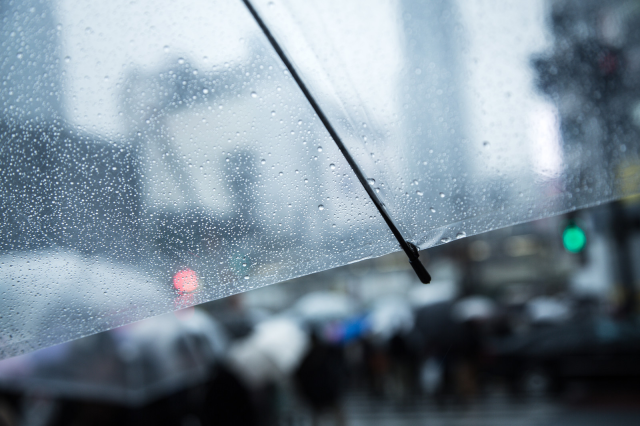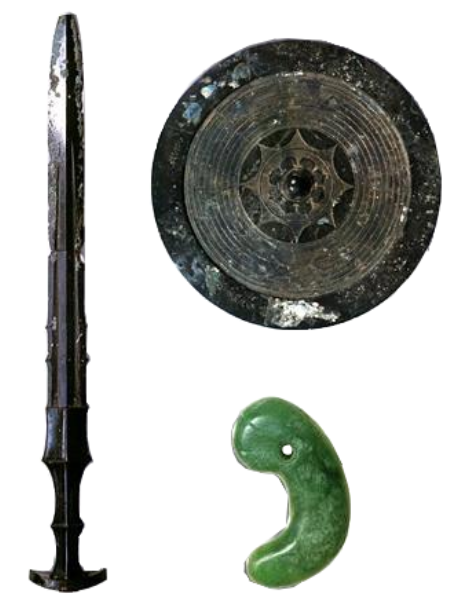
New emperor’s rainy enthronement ceremony takes place at Imperial Palace while the sword’s regular home experiences blue skies and sunshine.
Japan’s imperial succession procedure is a multi-stage affair. Back on May 1, an ascension ceremony was held for Emperor Naruhito as his father, Akihito, abdicated the monarchy, but another ceremony, the enthronement ceremony, was held for the new emperor on October 22 at the Imperial Palace in Tokyo.
All through the night of October 21, the capital experienced heavy rainfall, which continued into the gray, wet morning that Tokyoites woke up to. Such dreary weather may seem ironic on the auspicious day, but it turns out that the rainfall was actually entirely appropriate, and, according to legend, even inevitable.
▼ Emperor Naruhito at the enthronement ceremony
天皇陛下が皇居の宮中三殿の回廊に姿を見せられました。「天照大神」をまつる賢所(かしこどころ)に天皇陛下が拝礼し、「即位礼正殿(そくいれいせいでん)の儀」を行うことを伝えられる「即位礼当日賢所大前の儀」が始まりました。https://t.co/1uNKmpHJgm#nhk_news pic.twitter.com/XkQpzfnuk2
— NHKニュース (@nhk_news) October 22, 2019
As part of the ceremony’s proceedings, the new emperor is presented with Japan’s imperial regalia, known as the Three Sacred Treasures. These consist of the mirror Yata no Kagami, the curved jewel Yasakuni no Magatama, and the sword Kusanagi no Tsurugi.
▼ Conceptual images of the Three Sacred Treasures (the actual items have never been publicly displayed)
Kusanagi no Tsurugi literally means “Grass-Cutting Sword,” a reference to fabled use by Yamato Takeru, legendary ancestor of Japan’s emperors, to cut away grass that had set on fire in an attempt on his life. However, the sword is said to have existed for generations before it came into Yamato Takeru’s possession, and originally had a different name: Ame no Murakumo no Tsurugi, meaning “Sword of Heavenly Gathering Clouds.”
Suddenly Tokyo’s rainy weather on the day of the enthronement ceremony seems a lot more significant.
即位の礼で天叢雲剣が東京に来るからその力で雨が降ってるって投稿を見て関心はしつつオカルトだなーって思ってたんだけど、東京の雲の流れが今まで見てきた中で1番早くて本当に何らかの凄い力が働いているように感じた……偶然だとしても運命的 pic.twitter.com/JXLzmcPM9u
— fall (@kanadefall) October 22, 2019
But the noteworthy weather on October 22 doesn’t end there. While the sword was transferred to Tokyo for the ceremony, ordinarily it’s kept at Atsuta Shrine in Nagoya, Aichi Prefecture. So on the morning of the ceremony, when the Sword of Heavenly Gathering Clouds was now at the Imperial Palace, roughly 350 kilometers (217 miles) away, what was the weather like in Nagoya?
https://twitter.com/minaduki26_414/status/1186444770341617664Sunny, with hardly a cloud in the sky.
確かに!朝は結構寒くて暗かったのにめっちゃ太陽出てて眩しい😊
— ロコさんは龍以推し (@rokota_kkir) October 22, 2019
熱田神宮は近いから天叢雲剣が天叢雲を皇居に連れて行ったんだな〜だから皇居は雨とか🤦🏻♀️
さすが神話の国だ!三種の神器!
RT pic.twitter.com/maQerLuCf6
The alignment of legend and meteorology wasn’t lost on Japanese Twitter users, who posted comments including:
“Japan is a country of real fantasy…”
“The Sword of Heavenly Gathering Clouds is like an amazing magic blade.”
“They say it’s a sign of good fortune if it rains during a ceremony where the Sword of Heavenly Gathering Clouds is used, and it’s giving me goosebumps.”
“There’s something stirring about seeing an ancient legend happen again.”
So while most of the time Japan is like anywhere else in that most people woud prefer a sunny day to a rainy one, on this special occasion those in the know didn’t mind using their umbrellas while the ceremony was using its sword.
Source: Twitter/天叢雲剣
Top image: Pakutaso
Insert image: Wikipedia/Nesnad
● Want to hear about SoraNews24’s latest articles as soon as they’re published? Follow us on Facebook and Twitter!
Follow Casey on Twitter, where he’s imaging a world where The King of Fighters’ main character is named Kyo Amenomurakumo.


 Christian groups in Japan criticize emperor’s ascension ceremony as violation of constitution
Christian groups in Japan criticize emperor’s ascension ceremony as violation of constitution Japanese Christian groups hold press conference to protest emperor’s enthronement ceremony
Japanese Christian groups hold press conference to protest emperor’s enthronement ceremony Buildings used for the emperor’s Daijosai ceremony are open for public viewing until December 8
Buildings used for the emperor’s Daijosai ceremony are open for public viewing until December 8 Japanese Emperor rides by on Imperial Train, makes schoolgirls scream like he’s a boy band idol
Japanese Emperor rides by on Imperial Train, makes schoolgirls scream like he’s a boy band idol Japan issuing beautiful new coins to celebrate Emperor Naruhito’s enthronement
Japan issuing beautiful new coins to celebrate Emperor Naruhito’s enthronement Survey finds that one in five high schoolers don’t know who music legend Masaharu Fukuyama is
Survey finds that one in five high schoolers don’t know who music legend Masaharu Fukuyama is Japanese potato chip Rubik’s Cubes coming soon
Japanese potato chip Rubik’s Cubes coming soon Last chance coming up for amazing east Japan for all-you-can-ride Shinkansen-inclusive train pass
Last chance coming up for amazing east Japan for all-you-can-ride Shinkansen-inclusive train pass Clear tonkotsu ramen becomes a cult hit at “Ramen Runway” in Japan
Clear tonkotsu ramen becomes a cult hit at “Ramen Runway” in Japan Japanese net users reminisce over novelty pregnant Licca-chan doll with unlockable belly
Japanese net users reminisce over novelty pregnant Licca-chan doll with unlockable belly 10 vegetarian foods you can order at almost any Japanese restaurant
10 vegetarian foods you can order at almost any Japanese restaurant Nintendo releases Metroid-shaped ice cube/cooking tray and Samus arm cannon pillow【Pics】
Nintendo releases Metroid-shaped ice cube/cooking tray and Samus arm cannon pillow【Pics】 Yakuzen ramen restaurant in Tokyo is very different to a yakuza ramen restaurant
Yakuzen ramen restaurant in Tokyo is very different to a yakuza ramen restaurant Saitama is home to the best strawberries in Japan that you’ve probably never even heard of
Saitama is home to the best strawberries in Japan that you’ve probably never even heard of Do you use these “Philippine English” words and phrases?
Do you use these “Philippine English” words and phrases? The 10 most annoying things foreign tourists do on Japanese trains, according to locals
The 10 most annoying things foreign tourists do on Japanese trains, according to locals Starbucks Japan releases new sakura goods and drinkware for cherry blossom season 2026
Starbucks Japan releases new sakura goods and drinkware for cherry blossom season 2026 Naruto and Converse team up for new line of shinobi sneakers[Photos]
Naruto and Converse team up for new line of shinobi sneakers[Photos] Is Sapporio’s Snow Festival awesome enough to be worth visiting even if you hate the snow? [Pics]
Is Sapporio’s Snow Festival awesome enough to be worth visiting even if you hate the snow? [Pics] Japan has trams that say “sorry” while they ride around town…but why?
Japan has trams that say “sorry” while they ride around town…but why? Sakura Totoro is here to get spring started early with adorable pouches and plushies
Sakura Totoro is here to get spring started early with adorable pouches and plushies Starbucks Japan unveils new sakura Frappuccino for cherry blossom season 2026
Starbucks Japan unveils new sakura Frappuccino for cherry blossom season 2026 Poop is in full bloom at the Unko Museums for cherry blossom season
Poop is in full bloom at the Unko Museums for cherry blossom season Now is the time to visit one of Tokyo’s best off-the-beaten-path plum blossom gardens
Now is the time to visit one of Tokyo’s best off-the-beaten-path plum blossom gardens Playing Switch 2 games with just one hand is possible thanks to Japanese peripheral maker
Playing Switch 2 games with just one hand is possible thanks to Japanese peripheral maker Japan’s newest Shinkansen has no seats…or passengers [Video]
Japan’s newest Shinkansen has no seats…or passengers [Video] Foreigners accounting for over 80 percent of off-course skiers needing rescue in Japan’s Hokkaido
Foreigners accounting for over 80 percent of off-course skiers needing rescue in Japan’s Hokkaido Super-salty pizza sends six kids to the hospital in Japan, linguistics blamed
Super-salty pizza sends six kids to the hospital in Japan, linguistics blamed Foreign tourists in Japan will get free Shinkansen tickets to promote regional tourism
Foreign tourists in Japan will get free Shinkansen tickets to promote regional tourism Take a trip to Japan’s Dododo Land, the most irritating place on Earth
Take a trip to Japan’s Dododo Land, the most irritating place on Earth Archfiend Hello Kitty appears as Sanrio launches new team-up with Yu-Gi-Oh【Pics】
Archfiend Hello Kitty appears as Sanrio launches new team-up with Yu-Gi-Oh【Pics】 Survey asks foreign tourists what bothered them in Japan, more than half gave same answer
Survey asks foreign tourists what bothered them in Japan, more than half gave same answer Japan’s human washing machines will go on sale to general public, demos to be held in Tokyo
Japan’s human washing machines will go on sale to general public, demos to be held in Tokyo Starbucks Japan releases new drinkware and goods for Valentine’s Day
Starbucks Japan releases new drinkware and goods for Valentine’s Day We deeply regret going into this tunnel on our walk in the mountains of Japan
We deeply regret going into this tunnel on our walk in the mountains of Japan Studio Ghibli releases Kodama forest spirits from Princess Mononoke to light up your home
Studio Ghibli releases Kodama forest spirits from Princess Mononoke to light up your home Major Japanese hotel chain says reservations via overseas booking sites may not be valid
Major Japanese hotel chain says reservations via overseas booking sites may not be valid Put sesame oil in your coffee? Japanese maker says it’s the best way to start your day【Taste test】
Put sesame oil in your coffee? Japanese maker says it’s the best way to start your day【Taste test】 No more using real katana for tourism activities, Japan’s National Police Agency says
No more using real katana for tourism activities, Japan’s National Police Agency says Japan’s new emperor ascends to throne, makes first speech with wish for peace, happiness
Japan’s new emperor ascends to throne, makes first speech with wish for peace, happiness Demon-slaying Dojigiri, one of Japan’s Five Swords Under Heaven, now on display at Kasuga Shrine
Demon-slaying Dojigiri, one of Japan’s Five Swords Under Heaven, now on display at Kasuga Shrine What is Teru Teru Bozu? The tragic history behind the Japanese fine weather doll
What is Teru Teru Bozu? The tragic history behind the Japanese fine weather doll Legendary crescent moon katana, one of Japan’s Five Swords Under Heaven, now on display in Tokyo
Legendary crescent moon katana, one of Japan’s Five Swords Under Heaven, now on display in Tokyo